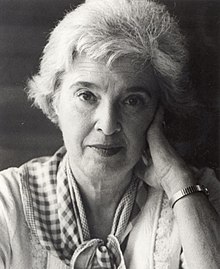Gerda Lerner
| Gerda Lerner | |
|---|---|

UW-Madison portrait, 1981
|
|
| Born |
Gerda Hedwig Kronstein April 30, 1920 Vienna, Austria |
| Died | January 2, 2013 (aged 92) Madison, Wisconsin, U.S. |
| Nationality | American |
| Education | New School for Social Research (A.B.), Columbia University (M.A.) and (Ph.D.) |
| Spouse(s) | Carl Lerner |
Gerda Hedwig Lerner (née Kronstein; April 30, 1920 – January 2, 2013) was an Austrian-born American historian and author. In addition to her numerous scholarly publications, she wrote poetry, fiction, theater pieces, screenplays, and an autobiography. She served as president of the Organization of American Historians in 1980-81. In 1980 she was appointed Robinson Edwards Professor of History at the University of Wisconsin-Madison, where she taught until retiring in 1991.
Lerner was one of the founders of the academic field of women's history. In 1963, while still an undergraduate at the New School for Social Research, she taught "Great Women in American History," which is considered to be the first regular college course on women's history offered anywhere.
She taught at Long Island University from 1965-67. She played a key role in the development of women's history curricula and was involved in the development of degree programs in women's history at Sarah Lawrence College (where she taught from 1968 to 1979 and established the nation's first master's degree program in women's history) and at the University of Wisconsin-Madison, where she launched the first Ph.D. program in women's history. She also worked at Duke University and Columbia University, where she was a co-founder of the Seminar on Women.
She was born Gerda Hedwig Kronstein in Vienna, Austria on April 30, 1920, the first child of Ilona (née Neumann) and Robert Kronstein, an affluent Jewish couple. Her father was a pharmacist, and her mother an artist, with whom Gerda, according to her autobiography, had a strained relationship as a child. As an adult, Gerda believed that her mother Ilona struggled because she did not fit in the role of a Viennese wife and mother. Gerda had a younger sister, and they attended local schools and gymnasium.
Following the 1938 Anschluss, Kronstein became involved with the anti-Nazi resistance. She and her mother were jailed that year after her father had escaped to Liechtenstein and Switzerland, where he stayed during the war. Gerda Kronstein occupied a cell for six weeks with two Christian women held on political grounds. They shared their prison food with her because Jews received restricted rations. In 1939 her mother moved to France, and Lerner's sister relocated to Palestine. That year Gerda immigrated to the United States under the sponsorship of the family of Bobby Jensen, her socialist fiancé.
...
Wikipedia
